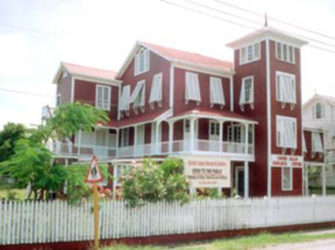Attorney General Basil Williams SC yesterday reiterated that the lease between the Cheddi Jagan Research Committee Inc (CJRCI) and the Guyana Lands and Surveys Commission is not valid.
In written submissions to acting Chief Justice Roxane George, Williams argued that under Section 10 (1) of the Lands Department Act, “Government lands shall only be rented or sold with the sanction of the President and on the terms and conditions determined by him.”
The CJRCI is challenging President David Granger’s revocation of its lease to Red House.
Former president Donald Ramotar had previously said that while he was president, he authorized and sanctioned the issuance of the lease of Red House to the CJRCI.

However, like he had previously argued during the submissions on whether the court had jurisdiction to hear the matter, Williams contended that contrary to what the CJRCI had advanced, there is no evidence of formal approval or sanction by Ramotar.
Williams said that on May 3, 2006, Ramotar, on behalf of the CJRCI, made an application to the Commissioner of Lands and Surveys Commission for a Lease of the Red House lands. In 2010, he said that a resubmission of the application was made to the then Office of the President.
All matters relating to application for a lease, he said, are required to be sequentially recorded on note sheets in the casefile. But he noted that in the instant case, this was not done.
The AG added that on January 11, 2011, a further resubmission was made but there is no evidence of any sanction by then president Bharrat Jagdeo on the purported schedule—only those of Doorga Persaud, Commissioner of Lands and Surveys and the Land Administration Manager.
Williams said that on March 30, 2012, however, a lease agreement was completed between Persaud, Commissioner of Lands and Surveys on behalf of the Government and Ralph Ramkarran SC, on behalf of the CJRCI.
According to the AG, non-sanction by the president renders the purported lease void from the outset and having no legal effect. He said it would therefore be incapable of constitutional protection, making the applicants trespassers.
Williams also argued that the lease fails to comply with the provisions of Sections 13(1) (2) and (3) of the Deeds Registry Act, as regards it being for a term of 21 or more years.
According to the AG, the respective subsections of the Act provides that the lease must have been passed and executed in like manner of a transport filed as a record in the registry.
Meanwhile, in keeping with subsections (2) and (3), the law provides that the lease must be filed as a record in the registry and annotated by the Registrar. The AG said that the CJRCI has produced no evidence to substantiate that the purported lease was ever executed in accordance with the relevant provisions.
The state also submitted that that the applicant, without the express permission from the designated minister, cannot execute a lease of property declared to be National Monuments under Section 3(1) of National Trust Act.
Williams said that no such permission was ever given. He said, too, that no formal agreement assigning control of the property to Red House; though staff, utilities, repairing, renovating and restoring the heritage building were paid for by the previous PPP/C administration without lawful approval.
Counsel for the applicant, attorney Anil Nandlall, has to file responses to Williams’ submissions by June 19, when the case will continue.
Last year, President Granger announced that the lease held by the Research Centre to the heritage building would be revoked.
On December 30, 2016, CJRCI secured an order from the court against the government’s revocation of its lease. The consent order operated to freeze the government’s instruction that the High Street premises be vacated by December 31, 2016.
It sought to restrain the Attorney General and every other officer of the state “from evicting or ejecting or in any way, interfering with the peaceful and quiet occupation and possession of this building by the Cheddi Jagan Research Institute.”
In a supporting affidavit, Nandlall had advanced that the threatened revocation of its leasehold interest amounted to a deprivation of its property without proper compensation.
At a March 24 hearing, the court had ruled in Nandlall’s favour that it had jurisdiction to hear the case, which the AG was contending it did not have.




